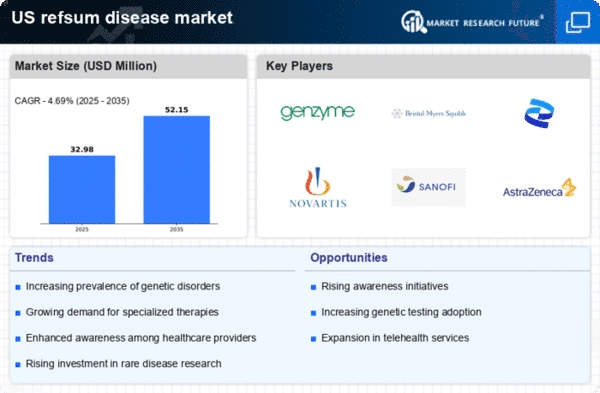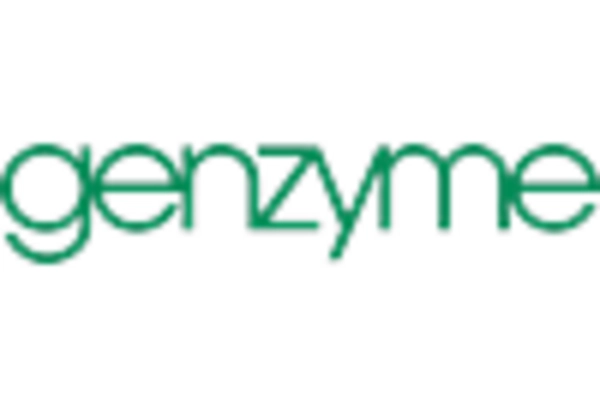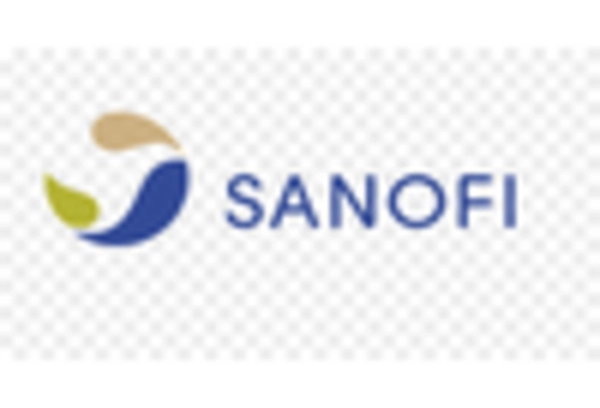Increased Research Funding
Increased research funding for rare diseases, including Refsum disease, is a critical driver for the refsum disease market. Government and private organizations are recognizing the need for more research into rare genetic disorders, leading to a surge in available grants and financial support. This influx of funding is likely to facilitate the development of new therapies and improve understanding of the disease mechanisms. The refsum disease market stands to benefit from this trend, as researchers and pharmaceutical companies collaborate to explore innovative treatment options. As more studies are conducted, the potential for breakthroughs in therapy and management strategies increases, which could significantly enhance market growth.
Growing Patient Advocacy Groups
The emergence of patient advocacy groups dedicated to Refsum disease is influencing the refsum disease market positively. These organizations play a vital role in raising awareness, providing support, and advocating for research funding. By mobilizing patients and families, they create a community that fosters dialogue with healthcare providers and policymakers. The refsum disease market is likely to see increased engagement from these groups, which can lead to more resources being allocated for research and treatment options. Additionally, advocacy efforts may result in improved access to care and support services for patients, further driving market demand.
Rising Incidence of Refsum Disease
The rising incidence of Refsum disease in the US is a notable driver for the refsum disease market. As awareness of this rare genetic disorder increases, more cases are being diagnosed. According to the National Institutes of Health, the prevalence of Refsum disease is estimated to be around 1 in 1 million individuals. This growing recognition leads to a higher demand for diagnostic tools and treatment options, thereby expanding the market. The refsum disease market is likely to see increased investment in research and development as healthcare providers seek to address the needs of affected patients. Furthermore, the identification of new cases may prompt healthcare systems to allocate more resources towards managing this condition, which could further stimulate market growth.
Regulatory Support for Rare Disease Treatments
Regulatory support for treatments targeting rare diseases, including Refsum disease, is a significant driver for the refsum disease market. The US Food and Drug Administration (FDA) has established various programs to expedite the development and approval of therapies for rare conditions. This regulatory environment encourages pharmaceutical companies to invest in research and development for Refsum disease treatments. The refsum disease market is likely to benefit from these initiatives, as they can lead to faster access to innovative therapies for patients. As more treatments receive regulatory approval, the market is expected to expand, providing new options for those affected by this rare disorder.
Technological Advancements in Diagnostic Tools
Technological advancements in diagnostic tools are significantly impacting the refsum disease market. Innovations such as next-generation sequencing and advanced biochemical assays are enhancing the accuracy and speed of diagnosis. These technologies allow for earlier detection of Refsum disease, which is crucial for effective management and treatment. The refsum disease market is experiencing a shift towards more precise diagnostic methods, which can lead to improved patient outcomes. As healthcare providers adopt these advanced tools, the demand for related services and products is expected to rise. This trend may also encourage pharmaceutical companies to invest in developing targeted therapies, further driving market expansion.

















